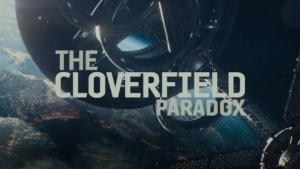“The Cloverfield Paradox” (which recently debuted on Netflix), the third installment of the loosely connected Cloververse saga, takes topical physics such as the recently discovered God Particle and the popular multiverse theory and smashes them into a movie that has little to do with science. Let’s just say it’s not going to pass muster with Neil deGrasse Tyson or Michio Kaku. But while the space station crew’s paranoia amid a series of disasters is familiar, there’s still fun to be had here if you’re in the mood (and if you already have Netflix, you saved money on a movie ticket this time around).
Set in the near future, the crew of the Cloverfield Space Station is running an experiment with a particle accelerator because it’s considered too dangerous to do it on Earth. Even so, a science pundit played by “Gotham’s” Donal Logue warns that the experiment could rip apart space-time and unleash chaos everywhere.
The theoretical physics behind things like antimatter engines might make for interesting Science Channel viewing, but “Paradox” writers Oren Uziel (“22 Jump Street”) and Doug Jung (“Star Trek Beyond”) and director Julius Onah are making a space thriller, so the film’s science turns wishy-washy pretty quick. The bottom line is that if the experiment works, things look good for the future of humanity. If it fails, the energy-crisis fueled apocalypse down on our home planet will continue to spiral.
“Paradox” does the basics well enough to hold a viewer’s attention. The emotional core is astronaut Hamilton (Gugu Mbatha-Raw) and her Earth-bound doctor husband Michael (Roger Davies); both must deal with serious stakes even as it looks like they may not see each other again.
A smidgen of tension among the astronauts comes from the Earthbound politics. As with “Life” (2017) and “Independence Day: Resurgence” (2106), numerous nations are represented among the crew, but in this film they’re not above nationalist spats – particularly Volkov (Aksel Hennie) and Schmidt (Daniel Bruhl, “The Alienist”), since a Russian-German war is percolating on the globe below.
Then “Paradox” becomes a monster movie. The tone isn’t exactly scary, and indeed there’s an arc featuring Mundy (“Bridesmaids’ ” Chris O’Dowd) and a dismembered arm that – perhaps unavoidably, given the subject matter – tiptoes (or tip-fingers?) into comedic “Idle Hands” or “Dead Alive” territory. In contrast, we get good horror-style set pieces, although the originality wavers from a straight copy of “Alien’s” “there’s something inside him” scene to a tense sequence of an astronaut trapped between two portholes as the room fills with water.
The final act throws some multiverse conundrums at us, such as: Are people on your own Earth more valuable – indeed, more “real” — than people on the Earth of another dimension? Our knee-jerk answer to that question might explain why the Earth of the Cloververse is grim and war-torn even in a scientifically exciting future.
That brings us to the deeper level of the Cloververse: Even as we’re treated to the space thriller of “Paradox,” the wider saga unfolds on Earth. Amid the massive and vaguely defined disaster (although we can assume from the previous films that Godzilla-esque monsters are in the mix), Michael saves an inexplicably stranded girl, Molly (the ironically named Clover Nee), and takes her to his fallout shelter. “Paradox’s” memorable final image then drives home the point that whatever scientific advancement was made with the antimatter engine (or whatever that was about), things are looking bleak for humanity.
The final image is neat, but the same general message was delivered at the end of “Cloverfield” (2008), a handheld-footage monster chase flick, and “10 Cloverfield Lane” (2016), about a woman trapped in a fallout shelter with a paranoid prepper while (we ultimately learn) monsters cut loose aboveground.
I’m of two minds: On one hand, each film gains depth by being a small slice of this larger narrative, and fans do get some fun discussion points. (For example, why does the term “Cloverfield” carry through seemingly unrelated things: A top-secret project, a street name and a space station?) On the other hand, this wider narrative has not advanced much in 10 years. At some point, the saga is going to have to stop beating around the bush and tell its bigger story. If it never does, this whole thing has to be classified as a not-so-top-secret gimmick.


